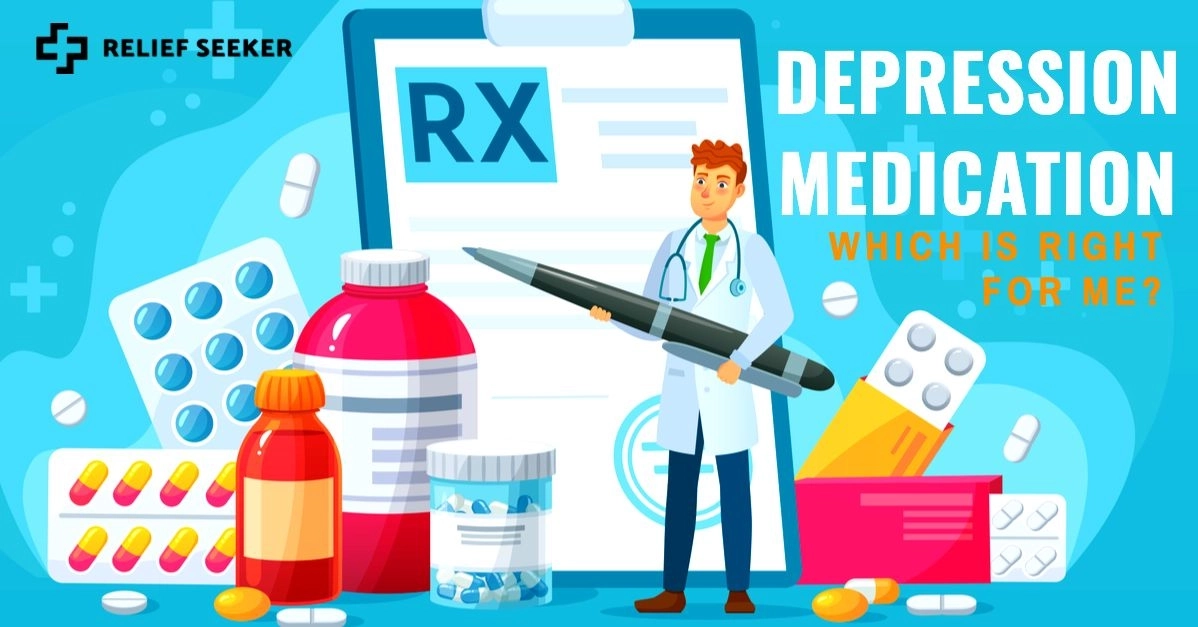Let’s face it, living with depression is hard, crippling even -- Finding the best medication to manage your mental health and treat your depression shouldn’t be.
Depression can be treated with both medication and counseling, sometimes in tandem. It is important to talk to your doctor or other healthcare providers to find out what works best for you. Since depression affects your brain, any drug you choose to use for treatment will react differently and works by balancing specific chemicals in your brain; these are called neurotransmitters.
There are so many antidepressants on the market today, and it’s hard to choose which one will be best suited for you. And sometimes the first one you try won’t be the most beneficial; keep trying.
If you’re suffering from depression and don’t know where to begin, read on to find out which medication is right for you.
Drug Classes for Depression Medication Snapshot
|
Class |
Most Common Drug |
|
SSRIs |
Fluoxetine (Prozac), sertraline (Zoloft), paroxetine (Paxil), citalopram (Celexa), escitalopram (Lexapro), and fluvoxamine (Luvox) |
|
SNRIs |
Venlafaxine (Effexor XR), duloxetine (Cymbalta), and desvenlafaxine (Pristiq) |
|
NDRIs |
Bupropion (Wellbutrin) |
|
MAOIs |
phenelzine, isocarboxazid, tranylcypromine, and selegiline |
|
TCAs |
amitriptyline, nortriptyline, imipramine, desipramine, doxepin, and protriptyline |
Drug Classes of Depression Medications
According to the Mayo Clinic, there are five common drug classes for depression medications. Each class has its own set of benefits and how they affect the wiring in your brain and the chemicals that pass along signals from one nerve to another. These chemicals include serotonin, dopamine, and norepinephrine.
Many of today’s most widely used drugs fall into these classes:
- Selective Serotonin Reuptake Inhibitors (SSRIs)
- Serotonin and Norepinephrine Reuptake Inhibitors (SNRIs)
- Norepinephrine and dopamine reuptake inhibitors (NDRIs)
- Monoamine Oxidase Inhibitors (MAOIs)
- Tricyclic Antidepressants (TCAs)
Other, less common antidepressants are available and more natural depression remedies, such as goal setting, exercise, getting enough sleep, and other vitamin supplements like fish oil, St. John’s Wart, and folic acid.
As you read on, you will find out which drugs can work best for you, along with their possible side effects.
Selective Serotonin Reuptake Inhibitors (SSRIs)
SSRIs are some of the most commonly prescribed class of antidepressants. With any SSRI, there is usually an imbalance of serotonin (a chemical that produces happy thoughts) as this class of drugs fight depression by decreasing the serotonin reuptake in your brain. These types of antidepressants leave more serotonin in your brain for the neurotransmitters to work with.
SSRIs include the following medications:
- Sertraline (Zoloft)
- Fluvoxamine (Luvox)
- Escitalopram (Lexapro)
- Fluoxetine (Prozac, Sarafem)
- Paroxetine (Paxil, Pexeva, Brisdelle)
- Citalopram (Celexa)
A few of the common side effects are but are not limited to nausea, restlessness, constant shaking, anxiety, and sexual problems, like inability, to perform or decreased libido.
Serotonin and Norepinephrine Reuptake Inhibitors (SNRIs)
These are among the newer antidepressants on the market, and as the name states, SNRIs help improve serotonin and norepinephrine levels in your brain. Norepinephrine is the chemical in the brain that forces the contraction of the heart, controlling your blood pressure, and producing the fight-or-flight response. These drugs include:
- Venlafaxine (Effexor XR)
- Duloxetine (Cymbalta)
- Desvenlafaxine (Pristiq)
- Levomilnacipran (Fetzima)
Side effects include nausea, constipation, fatigue, dry mouth, drowsiness, and decreased interest in intimacy.
Norepinephrine and dopamine reuptake inhibitors (NDRIs)
NDRIs are yet another class of reuptake inhibitors. This class of depression medications affects the reuptake of norepinephrine and dopamine. Dopamine plays a role in how we feel pleasure, how we plan, it helps us strive, focus, and find things interesting. This class of drugs includes only one, Bupropion.
Common side effects of Bupropion (Wellbutrin) include headaches, weight loss, fast heartbeat, dry mouth, sore throat, and constipation and these effects are generally mild, resolving in the first couple weeks of treatment.
Bupropion can also be used to treat anxiety when used in tandem with an SSRI and help people quit smoking.
Monoamine Oxidase Inhibitors (MAOIs)
This class of antidepressants was some of the first to be used for depression. These drugs have been effective but, unfortunately, can have serious side effects, especially in overdose.
This class of drugs is more challenging for people because of how its chemical makeup interacts with other prescription drugs, over-the-counter medications, and some foods. In today’s world of excess drug choices, doctors only consider these drugs when newer, more relevant drugs haven’t helped. If, for whatever reason, this class of drugs works for you, it is crucial to talk with your doctor about all the medications prescribed or non-prescribed that you take, as well as what your diet consists of because, unfortunately, it is super easy to accidentally overdose with this drug class. MAOI medications include:
- Tranylcypromine (Parnate)
- Isocarboxazid (Marplan)
- Selegiline (Emsam)
- Phenelzine (Nardil)
Like other drug classes, MAOIs have many side effects. These effects include nausea, restlessness, dizziness, and drowsiness.
Tricyclic Antidepressants (TCAs)
Tricyclic antidepressants are also known as cyclic antidepressants. This drug class, like MAOIs, were some of the earliest antidepressants developed and used to treat depression. They are also effective, but with the advancement in modern medicine, they aren’t used as frequently and are usually replaced by medications that cause fewer side effects. However, these drug options have been a great choice for certain people when other treatment options have failed.
This drug's common side effects include weakness, headaches, blurred vision, lightheadedness, and drowsiness.
Natural Treatments For Depression
If taking medication isn’t your thing, fear not; there are alternative, homeopathic options to treat depression. As we’ve said before, please, always consult your doctor before you make any depression treatment decisions on your own. Even if you decide to take the more natural path, you will still need to talk to your doctor to make sure this is the right course of action for you. Natural options might not seem like they have adverse effects, but this might not be the best treatment plan for you.
Natural treatments for depression include:
- St. John’s Wort
- Omega-3 Fatty Acids, like fish oil
- Lavender
These three natural alternatives do have their benefits; they can increase the serotonin levels that your brain is transmitting, improve your mood, and help you relax, but like other treatment plans, they also come with side effects. These side effects can include stomach aches, headaches, and worst of all, they may not mix with other medications you might be taking. Again, it is important to communicate all relevant information with your doctor or other medical professionals.
Other Factors to Consider When Choosing the Right Depression Medication
Unfortunately, drug classes and their side effects aren’t the only things to consider when you’re choosing an antidepressant to treat your depression. You’ll need to ask yourself:
- What medications am I already taking?
- Am I pregnant, or do I want to become pregnant (for women, of course)?
- Do I have any underlying health conditions?
- How will this affect me and my health in the long-term?
- Do I have health insurance to cover the costs associated with seeing a doctor and taking medication?
- Do I actually want to take medication?
How to Talk to Your Doctor about a Depression Treatment Plan
First of all, we hope you don’t blame yourself or feel ashamed that you’re feeling this way. Depression is a widespread mental health disorder that affects more people than you probably realize. Especially in these unprecedented times during 2020, the overwhelming feelings of depression can creep up at any point; you are not alone. It might be easy to stuff your feelings into a deep hole and forget about them, but unfortunately, those feelings will rear their ugly heads at some point.
Remember, depression is a real illness. That said, people with depression need treatment just like any other person, with any illness, and if you think you might be depressed, see your doctor -- as soon as you can.
When you do meet with your doctor, here are some things to bring up:
- Any symptoms you might be having; physical, emotional, behavioral changes, or mental
- Your mood and how it affects you in everyday life
- Important personal information, such as traumatic events or stressful situations that you’ve experienced; both in the past and present
- Medical information, including any medications you’re currently taking, prescribed, or over-the-counter
- Any other questions you might want to ask your doctor
Remember, your doctor is a trusted advisor and is there to help you. Be as open and honest with them as possible. Medical professionals aren’t there to judge you; they are only there to help.
Yes, it can be very intimidating talking to someone that doesn’t know or understand how you might be feeling, but keep in mind that they only want what’s best for you and your mental health.
That’s a Wrap
After reading this article, we hope you can decide which depression medication is best for you. There are many options out there, and yes, it can be challenging to choose the best course of treatment without knowing all the information or trying out a few options. Depression isn’t an easy disorder to deal with but finding the best medication can be if you’re open to a few trial runs. The first medication may not work, but fear not, the second could work marvelously, having you on a successful depression management path.


